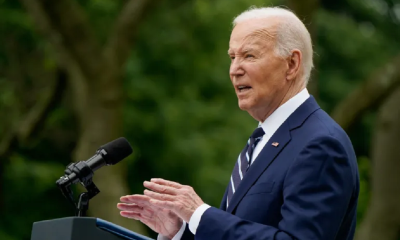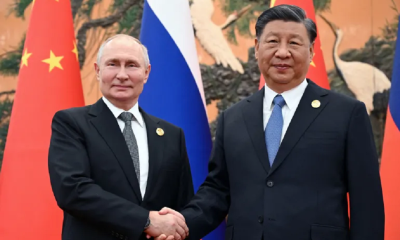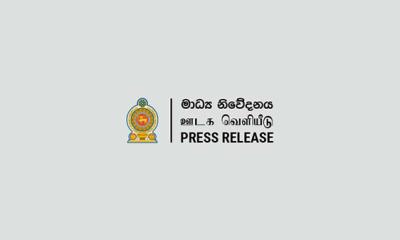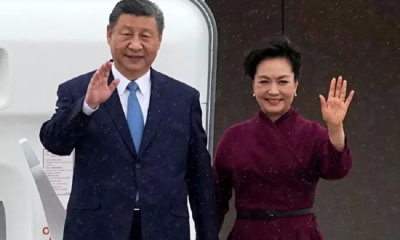News
China trying to influence SL media

US State Department funded study says…
In a new report, titled ‘Beijing’s Global Media Influence: Authoritarian Expansion and the Power of Democratic Resilience’, Freedom House said that the Chinese party-state’s media influence efforts intensified in Sri Lanka during the period of 2019-21.Freedom House is a non-profit organization primarily funded by USAID and the U.S. State Department.
Among the key findings of the report are: “Increased influence efforts amid political change: The Chinese party-state’s media influence efforts intensified during the coverage period of 2019-21. Pro-Beijing influencers have increased their activities in the social media space—particularly their outreach to younger Sri Lankans—and new agreements with elites, including in the think tank space, have shaped conversations in the media. The return of the Rajapaksa family to power in 2020 and protests ousting them in 2022 increased restrictions on press freedom and attacks on journalists.
“Mixed public response: China is sometimes viewed as a friendly power that can act as a balancing force against Western influence and which provided much needed COVID-19 aid. At the same time, public backlash and concern over its economic influence has grown since a Chinese state-run company was awarded a 99-year lease to Sri Lanka’s Hambantota Port in 2017.
“Close ties with elites:
High-level ties between the Sri Lankan and Chinese governments have led to political and business leaders parroting Chinese propaganda points, in both domestic and international forums, including on adopting the Chinese governance model and the human rights situation in Xinjiang. State-owned paper Daily News, national business paper the Daily FT, and some elite-run cultural organizations and think tanks have been consistent vessels for Chinese state content and narratives.
“Aggressive diplomatic push on social media:
Chinese diplomats have adopted “wolf-warrior” tactics, regularly pushing back against criticism on social media platforms. Chinese diplomatic accounts in Sri Lanka have also benefited from amplification by fake accounts.
“China Radio International:
China Radio International has content targeted to Sri Lankan audiences in the dominant local language Sinhala on FM radio. It is also available in both Sinhala and Tamil on social media, with over 1.4 million followers for one of the Sinhala accounts.
“Social media influencers target youth:
Since 2020 especially, Facebook influencers affiliated with Chinese state media have increasingly pushed content targeting young adults in local languages including Sinhala. These accounts have up to 1.2 million followers and promote content that showcases the positive, apolitical sides of China while occasionally pushing pro-Chinese Communist Party content. Social media platforms have struggled to keep up with labeling them as Chinese state-controlled sources.
“Embassy efforts to silence criticism:
Journalists and news outlets in Sri Lanka that report unfavourably on the Chinese government or its involvement in the country have been pressured by the Chinese embassy or other Chinese state-linked actors into issuing apologies or removing content. Such incidents have contributed to some self-censorship among journalists.
“No local Chinese-language media:
There is no local Chinese-language media, reflective of the small size of the Chinese diaspora in the country.
“Limited China expertise but growing civil society attention: Sri Lanka has limited expertise on domestic Chinese politics and Chinese Communist Party influence mechanisms. However, there is a vibrant press freedom community and a growing contingent among civil society drawing attention to Chinese state propaganda, covert social media manipulation, and infrastructure projects involving China such as the Colombo Port City. Media literacy is relatively high in the country, serving as another buffer to Chinese state influence.
“Media self-regulation gaps:
Media professionalism in Sri Lanka is notably low, with little culture of investigative reporting. There is, however, a growing number of journalist training and government initiatives to tackle these gaps.
“Lack of safeguards against political influence:
While there are laws enhancing ownership transparency and limiting foreign ownership, there are no laws against cross- ownership and partisan ownership, putting Sri Lankan media at risk of undue political influence—especially given strong governmental ties with China and the tendency for media outlets to have political affiliations. The government has also intensified its targeting of journalists in recent years, increasing the risk of self-censorship on perspectives that counter the government line.”
News
US sports envoys to Lanka to champion youth development

The U.S. Embassy in Colombo welcomed the U.S. Sports Envoys to Sri Lanka, former National Basketball Association (NBA) and Women’s National Basketball Association (WNBA) players Stephen Howard and Astou Ndiaye, from June 8 through 14.
The Public Diplomacy section of the U.S. Embassy said that it would launch a weeklong basketball program intended to harness the unifying power of sports, made possible through collaboration with Foundation of Goodness and IImpact Hoop Lab.
While in Sri Lanka, Howard and Ndiaye, both retired professional basketball players, will conduct a weeklong program, Hoops for Hope: Bridging Borders through Basketball. The Sports Envoys will lead basketball clinics and exhibition matches and engage in leadership sessions in Colombo and Southern Province for youth aged 14-18 from Northern, Uva, Eastern and Western Provinces, offering skills and leadership training both on and off the court. The U.S. Envoys will also share their expertise with the Sri Lanka Basketball Federation, national coaches, and players, furthering the development of basketball in the country. Beyond the clinics, they will collaborate with Sri Lankan schoolchildren to take part in a community service project in the Colombo area.
“We are so proud to welcome Stephen and Astou as our Sports Envoys to Sri Lanka, to build on the strong people-to-people connections between the United States and Sri Lanka,” said U.S. Ambassador Julie Chung. “The lessons that will be shared by our Sports Envoys – communication, teamwork, resilience, inclusion, and conflict resolution – are essential for leadership development, community building, equality, and peace. The U.S. Sports Envoy program is a testament to our belief that sports can be a powerful tool in promoting peace and unity.”
News
Rahuman questions sudden cancellation of leave of CEB employees

SJB Colombo District MP Mujibur Rahuman in parliament demanded to know from the government the reasons for CEB suspending the leave of all its employees until further notice from Thursday.
MP Rahuman said that the CEB has got an acting General Manager anew and the latter yesterday morning issued a circular suspending leave of all CEB employees with immediate effect until further notice.
“We demand that Minister Kanchana Wijesekera should explain this to the House. This circular was issued while this debate on the new Electricity Amendment Bill was pending. There are many who oppose this Bill. The Minister must tell parliament the reason for the urge to cancel the leave of CEB employees,” the MP said.However, Speaker Mahinda Yapa Abeywardena prevented Minister Wijesekera responding to the query and said that the matter raised by MP Rahuman was not relevant.
News
CIPM successfully concludes 8th Annual Symposium

The Chartered Institute of Personnel Management (CIPM) successfully concluded the 8th Annual CIPM Symposium, which took place on 31st May 2024. Themed “Nurturing the Human Element—Redefining HRM in a Rapidly Changing World,” the symposium underscored the pivotal role of human resource management (HRM) in today’s dynamic global landscape. Since its inception in 1959, CIPM has been dedicated to advancing the HR profession through education, professional development, and advocacy, solidifying its position as Sri Lanka’s leading professional body for HRM.
Ken Vijayakumar, the President of the CIPM, graced the occasion as the chief guest. The symposium commenced with the welcome address by the Chairperson, Prof. Arosha Adikaram, followed by the Web Launch of the Symposium Proceedings and Abstract Book by the CIPM President. The event featured distinguished addresses, including a speech by Chief Guest Ken Vijayakumar, President of CIPM, and an address by Guest of Honor Shakthi Ranatunga, Chief Operating Officer of MAS Holdings Pvt. Ltd., Sri Lanka.
The symposium also featured an inspiring keynote address by Prof. Mario Fernando, Professor of Management and Director of the Centre for Cross Cultural Management (CCCM) at the University of Wollongong, Australia.
Vote of Thanks of the inauguration session was delivered by Dr. Dillanjani Weeratunga, Symposium Co-chair.
The symposium served as a comprehensive platform for researchers to present their findings across a wide range of critical topics in HRM. These included Cultural Diversity and Inclusion, Talent Development and Retention, Ethical Leadership and Corporate Social Responsibility, Adapting to Technological Advancements, Mental Health and Well-being at Work, Global Workforce Challenges, Employee Empowerment, and Reskilling and Upskilling.
The plenary session was led by Prof. Wasantha Rajapakse. Certificates were awarded to the best paper presenters during the valedictory session, followed by a vote of thanks delivered by Kamani Perera, Manager of Research and Development.
The annual symposium of CIPM was a truly inclusive event, attracting a diverse audience that spanned undergraduates, graduates, working professionals, research scholars and lecturers. This widespread interest highlights the symposium’s significance in the field of HRM, offering a unique opportunity for everyone to network and learn from scholarly brains.The CIPM International Research Symposium was sponsored by Hambantota International Port, Sri Lanka Institute of Information Technology (SLIIT), E B Creasy & Co. PLC, and Print Xcel Company.
























